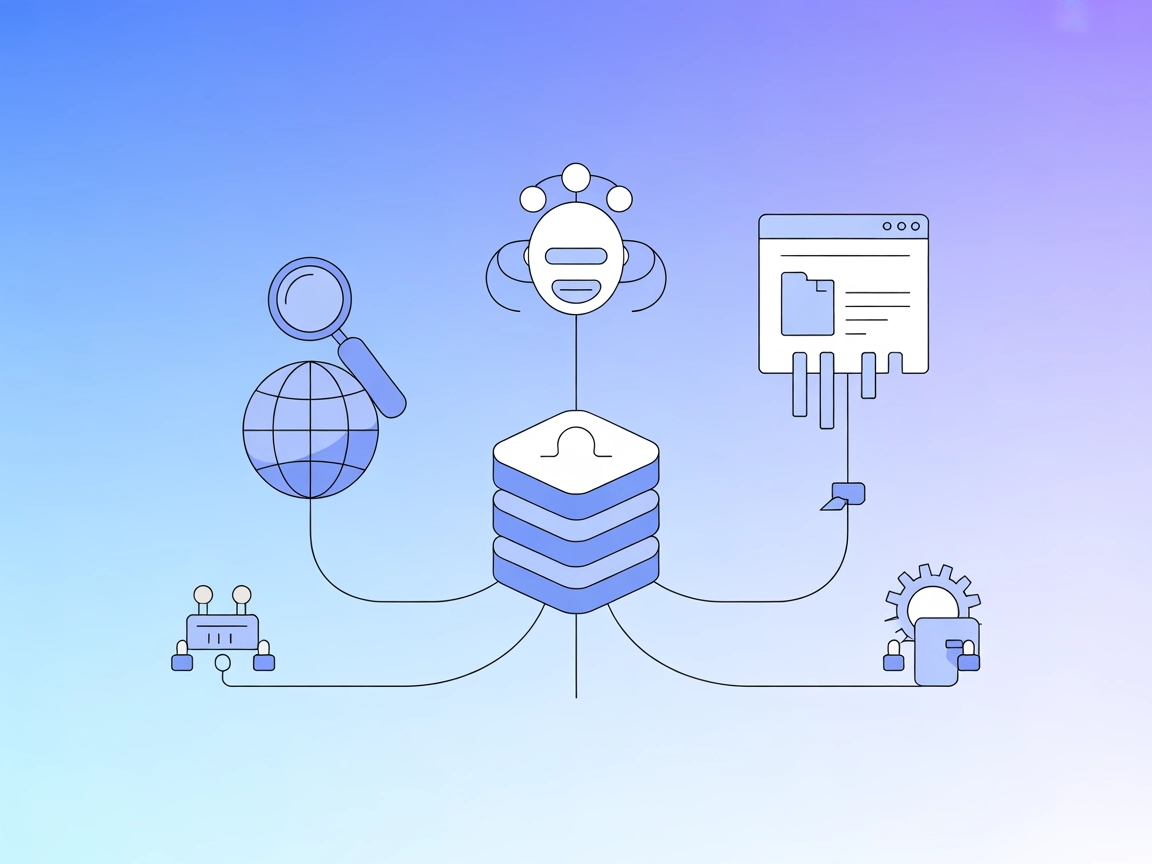
GreptimeDB MCP Server
The GreptimeDB MCP Server bridges AI assistants with GreptimeDB, enabling secure, structured, and programmatic access to time-series database functionalities su...
FlowHunt provides an additional security layer between your internal systems and AI tools, giving you granular control over which tools are accessible from your MCP servers. MCP servers hosted in our infrastructure can be seamlessly integrated with FlowHunt's chatbot as well as popular AI platforms like ChatGPT, Claude, and various AI editors.
MCP-Grep is a Model Context Protocol (MCP) server that wraps the local instance of the Unix grep utility, making its powerful search functionality accessible to AI assistants and MCP-compatible clients. By exposing grep as both a resource and a tool, MCP-Grep allows AI systems and developers to perform advanced pattern searches, text analysis, and file exploration tasks via a standardized API. This enables workflows such as searching for patterns in codebases, logs, or documents, retrieving context around matches, and interacting with the system’s grep binary for information about its capabilities. MCP-Grep enhances development and debugging workflows by supporting natural language prompts, integration with LLMs, and interactive exploration through the MCP Inspector.
grep binary, including its path, version, and supported features.grep binary. Supports options like case-insensitive matching, context lines, maximum match count, fixed string matching, and recursive directory searching.mcp-grep are installed: pip install mcp-grepwindsurf.config.json)mcpServers section with the following JSON:{
"mcpServers": {
"mcp-grep": {
"command": "mcp-grep-server",
"args": []
}
}
}
npx -y @smithery/cli install @erniebrodeur/mcp-grep --client claude
{
"mcpServers": {
"mcp-grep": {
"command": "mcp-grep-server",
"args": []
}
}
}
mcp-grep: pip install mcp-grep{
"mcpServers": {
"mcp-grep": {
"command": "mcp-grep-server",
"args": []
}
}
}
mcp-grep via pip: pip install mcp-grep{
"mcpServers": {
"mcp-grep": {
"command": "mcp-grep-server",
"args": []
}
}
}
If you need to set environment variables (e.g., for advanced setups), use this pattern:
{
"mcpServers": {
"mcp-grep": {
"command": "mcp-grep-server",
"args": [],
"env": {
"MY_SECRET_API_KEY": "${MY_SECRET_API_KEY}"
},
"inputs": {
"api_key": "${MY_SECRET_API_KEY}"
}
}
}
}
Note: MCP-Grep does not require an API key by default, but this demonstrates the pattern for secure secrets.
Using MCP in FlowHunt
To integrate MCP servers into your FlowHunt workflow, start by adding the MCP component to your flow and connecting it to your AI agent:

Click on the MCP component to open the configuration panel. In the system MCP configuration section, insert your MCP server details using this JSON format:
{
"mcp-grep": {
"transport": "streamable_http",
"url": "https://yourmcpserver.example/pathtothemcp/url"
}
}
Once configured, the AI agent is now able to use this MCP as a tool with access to all its functions and capabilities. Remember to change “mcp-grep” to whatever the actual name of your MCP server is and replace the URL with your own MCP server URL.
| Section | Availability | Details/Notes |
|---|---|---|
| Overview | ✅ | From README.md and project description |
| List of Prompts | ✅ | Example prompts in README.md |
| List of Resources | ✅ | grep://info resource |
| List of Tools | ✅ | grep tool |
| Securing API Keys | ✅ | Pattern shown; not required for this server |
| Sampling Support (less important in evaluation) | ⛔ | Not mentioned |
MCP-Grep provides a focused, well-documented implementation of MCP for the popular grep utility. It offers clear resources, tool definitions, and setup instructions, but does not document support for Roots or Sampling. Its simplicity and documentation make it a solid choice for developers needing search capabilities, but advanced MCP features are not covered.
| Has a LICENSE | ✅ (GPL-3.0) |
|---|---|
| Has at least one tool | ✅ |
| Number of Forks | 1 |
| Number of Stars | 4 |
Rating: 7/10
MCP-Grep is robust in its core functionality and documentation but lacks explicit coverage of advanced MCP features like Roots and Sampling. It is a practical and well-scoped server for search tasks.
MCP-Grep is a Model Context Protocol server that wraps the system grep utility, providing AI tools and developers with advanced pattern search and text analysis capabilities via a standardized API.
Typical use cases include log analysis, codebase exploration, configuration file search, security audits, and documentation search, enabling you to find patterns and context efficiently.
No, MCP-Grep does not require an API key by default. However, you can configure it to use environment variables for advanced setups.
Add the MCP component to your FlowHunt flow, configure it with your MCP-Grep server details, and your AI agent can use it for contextual search and analysis tasks.
MCP-Grep supports powerful grep options such as case-insensitive searching, context lines, recursive directory search, and more via natural language prompts and direct MCP API calls.
Supercharge your AI and automation workflows with advanced search capabilities using MCP-Grep. Integrate, search, and analyze with ease.

The GreptimeDB MCP Server bridges AI assistants with GreptimeDB, enabling secure, structured, and programmatic access to time-series database functionalities su...

The mcp-google-search MCP Server bridges AI assistants and the web, enabling real-time search and content extraction using the Google Custom Search API. It empo...

The ModelContextProtocol (MCP) Server acts as a bridge between AI agents and external data sources, APIs, and services, enabling FlowHunt users to build context...
Cookie Consent
We use cookies to enhance your browsing experience and analyze our traffic. See our privacy policy.